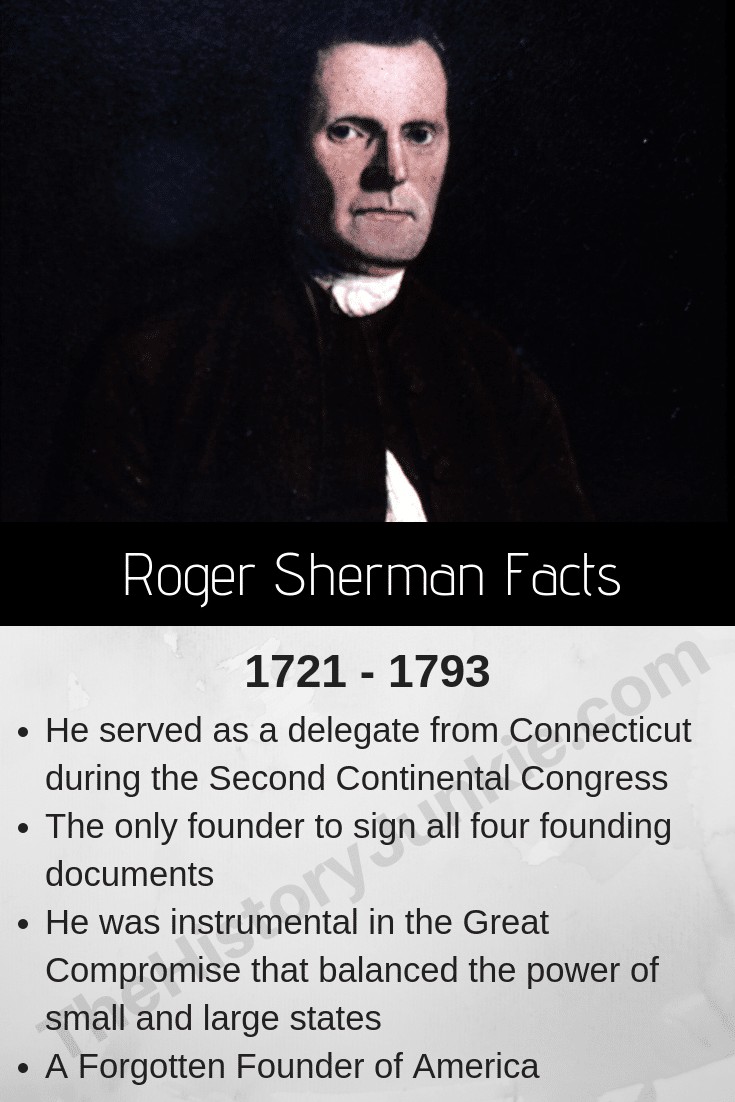Roger Sherman was a delegate from Connecticut and is well-known for what he did after the American Revolutionary War.

He was also the only one of the Declaration of Independence signers who signed all four of the important American documents: The Declaration of Independence, Articles of Association, Articles of Confederation, and The Constitution.
Sherman was born in 1721 in Massachusetts. His family moved to New Milford, Connecticut, shortly after his father died. Once arriving in New Milford, Sherman began to quickly gain influence in the community.
He opened the town's first store and became a surveyor. He was a skilled mathematician, which aided him in his store, surveying, astronomical calculations, and logic.
A friend advised him to read for the bar. Sherman did and was successful even though he was not formally educated in the law.
He held various positions in law before becoming a professor of religion at Yale College. Politically, Sherman was always a force, but his first significant office came in 1784 when he was elected Mayor of New Haven.
Roger Sherman's Facts and Biography
In 1775, he was present at the Second Continental Congress, and he actively served throughout the war.
He was part of the committee of five that helped draft the Declaration of Independence, which was authored by Thomas Jefferson on John Adams' recommendation. and was well-respected by the delegates.
However, Sherman's defining moment was not the Declaration of Independence. Although it was patriotic, it was the Constitution. The Constitutional Convention was headed up by George Washington and was at a stalemate.
Large states like Virginia had more representation and were able to push their will upon the smaller states like Rhode Island.
The smaller states argued that the representation should be equal per state, but the large states did not believe that would be fair since their states had more people living in them.
Sherman came up with what is called the Great Compromise, which was supported by Benjamin Franklin.
He proposed that the states should be represented in a proportion of their population in the lower house. In the upper house, which would be called The Senate, each state would be represented by two senators.
This was an ingenious idea and solved the problem.
Death and Epitaph
Roger Sherman would serve as Mayor of New Haven until his death in 1793. He was buried in Grove Street Cemetery.
Here is his epitaph:
In memory of THE HON. ROGER SHERMAN, ESQ, Mayor of the city of New Haven, and Senator of the United States. He was born at Newton, in Massachusetts, on April 19th, 1721, And died in -New-Haven, July 23d, A, D. 1793, aged LXXII. Possessed of a strong, clear, penetrating mind and singular perseverance, he became a self-taught scholar eminent for jurisprudence and policy. He was nineteen years an assistant and twenty-three years a judge of the superior court, in high reputation. He was a Delegate in the first Congress, signed the glorious Act of Independence, and for many years displayed superior talents and ability in the national legislature. He was a member of the general convention, approved the federal constitution, And served his country with fidelity and honour, in the House of Representatives and in the Senate of the United States. He was a man of approved integrity, a cool, discerning Judge, a prudent, sagacious Politician, and a true, faithful, and firm Patriot. He ever adorned the profession of Christianity which he made in youth; and distinguished through life for public usefulness, died in the prospect of a blessed immortality.
